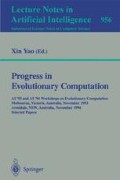Abstract
We present a comparison of modified and unmodified GAs for the MST problem. A GA assembles successful gene substrings into improved solutions, but it does not have a mechanism to enforce global constraints. Graph theory contains many problems that are suitable for GAs because polynomial-time algorithms do not exist, but they often have global constraints. Special encodings and modifications of GA operators have been developed to deal with this difficulty. We use the MST as an example problem because it is representative of the encoding difficulty, while the existence of polynomial-time algorithms makes the evaluation of performance relatively simple. We modify the GA crossover operator to preserve the property that an MST has 1 fewer edges than the number of vertices. Although this restricts the search space substantially, our results show that the expected benefits are not obtained. The GA demonstrates its power by successfully restricting the search without help.
Preview
Unable to display preview. Download preview PDF.
References
De Jong, K.A., Spears, W.A.: Using genetic algorithms to solve NP-complete problems. Proc. 3rd Annual Conf. on GAs. Morgan Kaufmann San Mateo (1989)
Graham, R.L., Hell, P.: On the history of the minimum spanning tree problem. Annals of the History of Computing. 7 (1985) 43–57
Kruskal Jr., J.B., On the shortest spanning subtree of a graph and the traveling salesman problem. Proc. ACM 7(1) (1956) 48–50
Prim, R.C.: Shortest connection networks and some generalizations. Bell Systems Tech. J. 36 (1957) 1389–1401
Dijkstra, E.W.: A note on two problems in connection with graphs. Numerische Mathematik 1 (1959) 269–271
Sollin, M.: Le trace de canalisation. Berge, C., Ghouilla-Houri, A. eds.: Programming, Games, and Transportation Networks. John Wiley NY (1965)
Baase, S.: Computer Algorithms: Introduction to Design and Analysis. Addison-Wesley Reading MA (1988)
Holland, J.H.: Genetic algorithms. Scientific American July (1992) 44–50
Goldberg, D.E.: Genetic Algorithms in Search, Optimization, and Machine Learning. Addison-Wesley Reading MA (1989)
Holland, J.H.: The dynamics of searches directed by Genetic Algorithms. In Y. C. Lee, ed.: Evolution, Learning and Cognition. World Scientific, Singapore (1988) 111–127
Goldberg, D.E.: Sizing populations for serial and parallel genetic algorithms. Proc. 3rd Annual Conf. on GAs. Morgan Kaufmann San Mateo (1989) 124–132
Schaffer, J.D., Caruana, R.A., Eshelman, L.J., Das, R.: A study of control parameters affecting online performance of genetic algorithms. Proc. 3rd Annual Conf. GAs. Morgan Kaufmann San Mateo (1989) 51–60
Antonisse, J.: A new interpretation of schema notation that overturns the binary encoding constraint. Proc. 3rd Annual Conf. on GAs. Morgan Kaufmann San Mateo (1989) 86–91
Jog, P., Suh, J.H., Gucht, D.V.: The effects of population size, heuristic crossover and local improvement on a genetic algorithm for the traveling salesman problem. Proc. 3rd Annual Conf. GAs. Morgan Kaufmann San Mateo (1989) 86–91
Cheeseman, P., Kanefsky, B., Taylor, W.M.: Where the really hard problems are. Proc. 12th Int. J. Conf. on AI. Morgan Kaufmann San Mateo (1991) 331–337
Author information
Authors and Affiliations
Editor information
Rights and permissions
Copyright information
© 1995 Springer-Verlag Berlin Heidelberg
About this paper
Cite this paper
Piggott, P., Suraweera, F. (1995). Encoding graphs for genetic algorithms: An investigation using the minimum spanning tree problem. In: Yao, X. (eds) Progress in Evolutionary Computation. EvoWorkshops EvoWorkshops 1993 1994. Lecture Notes in Computer Science, vol 956. Springer, Berlin, Heidelberg. https://doi.org/10.1007/3-540-60154-6_63
Download citation
DOI: https://doi.org/10.1007/3-540-60154-6_63
Published:
Publisher Name: Springer, Berlin, Heidelberg
Print ISBN: 978-3-540-60154-8
Online ISBN: 978-3-540-49528-4
eBook Packages: Springer Book Archive

